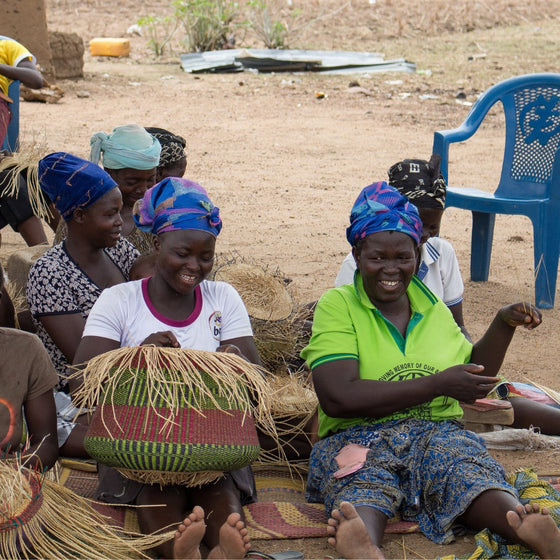
It is true that we are lovers of baskets and you will find baskets in every room of our house! We respect skilled craftsman from all over the world utilising their traditional skills to create amazing woven basketry among other products. We combine our passion for baskets with our desire to assist development in Ghana and are working hard to create further opportunities for our basket weavers.
Natural fibres woven into basket creations are growing in popularity not only because they are so useful for storage but also they look great as a home décor piece and when made right, can last forever. One fibre in particular that is very commonly found in all stores is seagrass. Seagrass is basically stain resistant and incredibly durable. It has many great eco friendly qualities as its fast growing and easy to harvest. This also makes it a relatively cheap product to make. All of these qualities mean we are seeing more and more seagrass products on the market.

Seagrass baskets are primarily made in Vietnam and China. As is often the case, basket weaving is a traditional skill passed through the generations in Vietnam, dating as far back as the imperial times. While the increasing demand for their skill set has been a great boost economically for Vietnam, unfortunately it can be to the detriment of preserving traditional culture. Villages are observed to be losing their traditional culture and values, including the rural and quiet atmosphere, raw materials grown in the village, and traditionally inherited skills. Even in the case of a skilled craftsman, the quality may be random, and simple copying of foreign products and popular products is prevalent. In particular, you will find commonly sold now is the seagrass “Bolga” basket. Named such as it mimics the same round shape and handle structure as the baskets traditionally woven in the rural villages in Bolgatanga, Ghana (commonly referred to as Bolga for short).

Bolga baskets are renown for their durability, bright colours and patterns. Made from elephant grass, which feels, stiffer and harder in comparison to seagrass, is a completely different material. Naming a replica of the original product by the same name “Bolga” is trying to capitalize off the popularity of genuine Bolga baskets. While imitation can be a form of flattery, it is not the case when you are appropriating culture and livelihood from people living in marginalized communities. Bolga is heavily dependant on the Bolga basket sales to assist in alleviating poverty in the area. The people of Bolga have worked hard on their craft and have earned the title for their baskets.
The market is flooded with basket products and they all vary by craftsmanship, quality of materials but many are responsible for driving the economic development of some rural communities. Bolga baskets are synonymous with Bolgatanga, Ghana and are responsible for 20% of Ghana’s overall export trade. It is an important growing industry not just for the Bolga region but also for Ghana overall.

Consumers are more aware than ever before about the importance of protecting our environment and conscious about shopping for sustainable materials, making baskets a great alternative to plastic. We love that our customers are making sustainable choices in their product selections but we write this to also raise awareness that some products are deep rooted in culture and be conscious that your choice is not taking away from someone’s traditional means of livelihood. Don’t purchase cheap imitations. This can have as much of an impact on our world as making sustainable choices.
So how can you tell the difference between genuine Bolga baskets and unethical imitations?



Shown on the left is a “Bolga” basket copy made in Asia.
Shown on the right is a genuine Bolga basket made in Bolga.



However it can be difficult to tell the difference when shopping online due to filters applied to photos, screen resolution differences and different devices used. So make sure you ask the store upfront if their products are genuinely made in Ghana. Of course you can rest assured that our business is run by Australian/Ghanaians, living in Ghana selling products made by Ghanaians.

If you are a retailer looking to stock wholesale baskets, beware of infringing these cultural and traditional boundaries when venturing onto websites like Alibaba. There are over 400 Vietnamese producers on Alibaba currently selling fake “Bolga” baskets – we’ve seen several of our own product photos on Alibaba along with photos of Ghanaian weavers on Vietnamese store pages!


Lets keep shopping sustainably and keep tradition and culture protected.
Comments will be approved before showing up.
Explore what truly defines a Bolga Basket. Each Bolga basket is a piece of individual expression. The designs, colours, shape and technique is unique to the weaver who handcrafted it. Each basket is an interpretation of life in Ghana, West Africa. Mothers are weaving while cooking, feeding, nursing, cleaning, schooling their children. Fathers are weaving while growing crops and brothers and sisters are watching, learning and developing their own take on the craft. It’s a balance of life and artistic feeling.



Skye
October 06, 2020
Well done on bringing this to light, this has been hurting our heart for years.